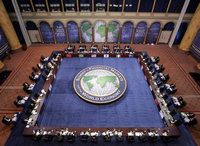
As the world economy stares down the most severe crisis it has seen in nearly a century, the International Monetary Fund (IMF) finds itself positioned somewhere between danger and opportunity: Danger lurks in emergent alternatives to the fund; opportunity lies in reform. Yet, reform requires change, and change does not come easily in the realm of international politics. Invariably, it creates winners and losers. The United States and Europe have long been the beneficiaries of the international financial institutions crafted during the waning hours of World War II. But the world of today is a far cry from that of […]
